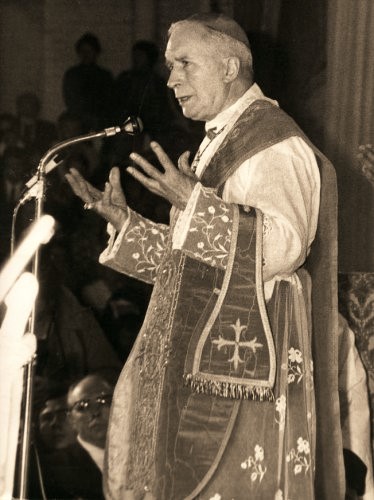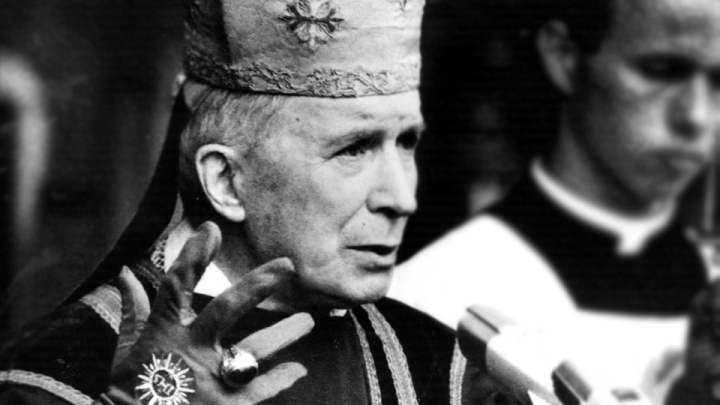Archbishop Dwyer wrote these words in his preface to Yves Congar’s 1976 book criticizing Archbishop Marcel Lefebvre, Challenge to the Church: The Case of Archbishop Lefebvre. Congar was, of course, one of the most highly respected champions of Vatican II: John Paul II made him a cardinal in 1994; Benedict XVI praised him as a one of the “great figures” of the Council; and Francis cited Congar as inspiration for the Synod on Synodality:
“Father Congar, of blessed memory, once said: ‘There is no need to create another Church, but to create a different Church.’”
As important as Congar was for the Council and its implementation, Archbishop Lefebvre was much more important for the “rigid” resistance to the anti-Catholic novelties proliferated by the Spirit of Vatican II. Congar filled his anti-Lefebvre book with sophistry and sickeningly manipulative half-truths, but he nonetheless provided one of the most succinct and accurate assessments of Archbishop Lefebvre’s importance:
“Rome wants to stop him before he succeeds in establishing himself with his own ministers.” (p. 75)
The timing of Congar’s book is worth noting as it shows the great sense of urgency to “stop” Archbishop Lefebvre. Congar wrote the introductory note to readers on September 3, 1976, but he devoted a few pages of the short book to an event that took place only a few days earlier:
“Witnesses who attended the Mass on 29 August 1976 at the sports stadium at Lille, together with the six daily newspapers and the two weeklies I read, are unanimous in stating that this event had a strongly marked political flavour; news-sheets sold at the gates, regimentation, Mgr Lefebvre’s speech, rounds of applause — all were significant.” (pp. 17-18)
Why was this particular Mass so important? Dr. David Allen White provided the context in his The Horn of the Unicorn:
“The Mass of All Time, the Roman Rite of the Catholic Church, became an orphan. Abandoned by its rightful fathers, it was shunted aside and banned from Catholic churches around the world. But it did not disappear. The True Sacrifice moved into hotel conference rooms, mobile trailers, basements of private homes and hastily constructed small chapels. In such settings it would seem that it could hardly become the center of public attention. On August 29, 1976, one Tridentine Mass came to be the center of the Catholic world and grabbed the attention of the non-Catholic media as well. One Catholic Archbishop celebrating one Mass magnetically drew thousands of adamant souls and revealed the substance of Catholic souls around the world.” (pp. 199-200)
As Dr. White described, the Mass had been requested by Archbishop Lefebvre’s friends and relatives in Lille, France — it was intended to be Mass for a small number of faithful but “once word got out, thousands of faithful traditional Catholics expressed their desire to display publicly their support for this much-maligned and now ‘suspended’ champion of their cause by attending this Mass.” (p. 200)
After ten years of Francis, it should be perfectly obvious to those who love the Church that everything would be immeasurably worse if Archbishop Lefebvre had not kept fighting.
Those who attended were blessed not only with the abundant graces of the Mass but also a sermon that strands among one of the most important in the post-Conciliar Church. And yet, as Archbishop Lefebvre insisted, he was simply doing what he had always done as bishop:
“I do not want to be head of the traditionalists, nor am I. Why? Because I also am a simple Catholic. A priest and a bishop, certainly; but in the very conditions in which you find yourselves, reacting in the same way to the destruction of the Church, to the destruction of our faith, to the ruins piling up before our eyes. Having the same reaction, I thought it my duty to form priests, the true priests that the Church needs. I formed those priests in a ‘Saint Pius X Society,’ which was recognized by the Church. All I was doing was what all bishops have done for centuries and centuries. That is all I did — something I have been doing for thirty years of my priestly life. . . And now when I am doing the same thing, a work exactly like what I have been doing for thirty years, all of a sudden I am suspended a divinis, and perhaps I shall soon be excommunicated, separated from the Church, a renegade, or what have you! How can that be? Is what I have been doing for thirty years liable also to suspension a divinis? I think, on the contrary, that if then I had been forming seminarians as they are being formed now in the new seminaries I should have been excommunicated. If then I had taught the catechism which is being taught in the schools I should have been called a heretic. And if I had said Mass as it is now said I should have been called suspect of heresy and out of the Church. It is beyond my understanding. It means something has changed in the Church; and it is about that that I wish to speak.”
This is what Rome had to stop: a Catholic bishop who loved the Church and spoke with the authority of a man who knew with absolute certainty that he was doing God’s will. This is why “the great” Yves Congar needed to rush a book into publication just days after Archbishop Lefebvre’s Mass at Lille.
 Abp. Lefebvre at Lille
Abp. Lefebvre at Lille
In the years between the sermon at Lille in 1976 and 1988, Rome had drifted further away from Catholic tradition, while Archbishop Lefebvre and his Society of St. Pius X (SSPX) had grown much more significant in their adherence to what the Church had always believed and practiced. Crucially, though, Archbishop Lefebvre had not yet secured the sustainability of his apostolate because he would soon pass to his eternal reward without leaving bishops who could ordain the SSPX’s future priests. What should he have done?
Many critics of Archbishop Lefebvre’s eventual consecration of the four bishops insist that he should have trusted Rome and gone along with the deal he negotiated with Cardinal Ratzinger, which would have allowed him to consecrate a bishop under certain conditions. If these critics are intellectually honest, though, they also would have preferred a scenario in which Archbishop Lefebvre had died or retired. After all, they argue that Archbishop Lefebvre’s “sin” was to consecrate bishops without Rome’s approval.
And if Archbishop Lefebvre had decided to retire to a monastery and cease all works of priestly formation instead of consecrating bishops, who among us could have blamed him? He had already suffered a long persecution at the hands of those who sought to radically transform the religion; and few, if any, churchmen in his lifetime had done so much for the Church. Surely those Traditional Catholics who denounce Archbishop Lefebvre’s “illicit” consecrations would revere his many saintly contributions to the Church if only he had retired (or died) prior to consecrating bishops.
Error and truth are not compatible. . . . Truth and error are not on the same footing. That would be putting God and the Devil on the same footing, for the Devil is the father of lies, the father of error." -Abp. Lefebvre, 1976
Where, though, would those Traditional Catholics be going to Mass today? There would be no SSPX. And, if Rome did not need to draw Catholics away from the SSPX, John Paul II would have had no need to establish the Ecclesia Dei communities. Moreover, Benedict XVI issued Summorum Pontificum to resolve the “SSPX problem” — and there would have been no need for him to “free the Mass” if there was no SSPX to ask him to do so as a pre-condition for discussions. Is there a plausible reason why Rome would have allowed some other bishop to become important enough to resist the Spirit of Vatican II in such an important way? Of course not.
Thanks be to God, Archbishop Lefebvre did not abandon the fight. Instead, after much prayer and deliberation he made the near impossible decision that only he could make. Those who were actively trying to destroy the Church did all they could to punish him, but he maintained peace of soul because he had only sought to accomplish God’s will.
After ten years of Francis, it should be perfectly obvious to those who love the Church that everything would be immeasurably worse if Archbishop Lefebvre had not kept fighting. Some seemingly sincere friends of Traditional Catholicism still insist that there was never any need for Archbishop Lefebvre to consecrate bishops without Rome’s approval. Like the Pharisees in Our Lord’s day, these masters of the law can string together a dizzying array for “proofs” to condemn Archbishop Lefebvre for his disobedience. But by condemning Archbishop Lefebvre’s “illicit” efforts to actually preserve the Church, while accepting the “licit” efforts of the progressivists to destroy the Church, they are today’s “blind guides, who strain out a gnat, and swallow a camel” (Matthew 23:24).
As Archbishop Lefebvre's tombstone reads, he sought only to give us what all the saints had always believed: “Tradidi quod et accepi" (I have transmitted what I have received).
With every passing week, the words of Congar and his fellow destroyers appear more false and evil; and the words of Archbishop Lefebvre appear more true and holy. Several of his books — especially Open Letter to Confused Catholics (available free online), They Have Uncrowned Him, and Against the Heresies — still rank among the most important books about the post-Conciliar attacks on the Church because they point Catholics to the true causes and remedies for the crisis. As he would tell us, every problem we see today relates in one way or another to putting truth and error side by side:
“Error and truth are not compatible. . . . Truth and error are not on the same footing. That would be putting God and the Devil on the same footing, for the Devil is the father of lies, the father of error. We must therefore be missionaries. We must preach the Gospel, convert souls to Jesus Christ and not engage in dialogue with them in an effort to adopt their principles.” (Sermon at Lille, August 29, 1976)
This is the only antidote to Francis’s unholy Synod on Synodality, which seeks to “enlarge the Catholic tent” to dialogue with those who hate the Church. If God is permitting the enemies of the Church to continue the destructive plans that Archbishop Lefebvre denounced fifty years ago, perhaps God is also leading those who love Him to realize that the saintly archbishop was correct all along. And those who seek to learn what Archbishop Lefebvre wanted us to know will discover that, as his tombstone reads, he sought only to give us what all the saints had always believed: “Tradidi quod et accepi" (I have transmitted what I have received) (I Cor. 15:3). Archbishop Lefebvre, pray for us! Immaculate Heart of Mary, pray for us!
Latest from RTV — Woke Pope, Woke Disney, Woke Beer, Woke World: WHEN DO WE WAKE UP?





